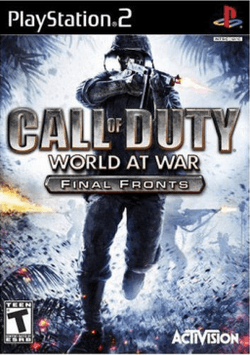Call of Duty: World at War – Final Fronts
| Call of Duty: World at War – Final Fronts | |
|---|---|
 | |
| Developer(s) | Rebellion Developments |
| Publisher(s) | Activision |
| Composer(s) | Sean Murray |
| Series | Call of Duty |
| Platform(s) | PlayStation 2[1][2][3] |
| Release date(s) | |
| Genre(s) | First-person shooter |
| Mode(s) | Single-player |
Call of Duty: World at War – Final Fronts is the 2008 PlayStation 2 counterpart to Call of Duty: World at War. It has its own set of missions involving the U.S. fighting in the Pacific theater and the Battle of the Bulge in Europe, as well as the British advancing on the Rhine River into Germany. This version features 13 missions. Final Fronts was developed by Rebellion Developments and published by Activision. It is also the last Call of Duty game to be released on the PlayStation 2.
Gameplay
Call of Duty: World at War - Final Fronts is a first-person shooter game. It focuses is on single-player campaigns, as it has no multiplayer. The game is set in World War II. The player can carry two guns at one time, as well as grenades. Levels are played with a team of soldiers from both Britain and the U.S, that assist the player by killing enemies and completing objectives. The game has been criticised by some critics for the poor AI, which is evident when friendly soldiers push the player out of cover and into the enemy line-of-fire.
Campaigns
The Game has 4 campaigns: War in the Pacific, Winter Offensive, Victory in Europe, and Victory in the Pacific. The player takes on the role of a marine in the Pacific campaigns and both British and American soldiers in the European campaign. The War in the Pacific and Victory in the Pacific Campaigns see Private Joe Miller (a reference to World at War protagonist C. Miller) and his fellow soldiers Sgt. Roebuck and Pvt. Polonsky (also in World at War) fight their way through Japanese defenses on Guadalcanal, Betio, Saipan, and Okinawa. A major difference in the American campaign from World at War is the fact that both Roebuck and Polonsky survive the final battle for Okinawa (also, Sgt. Roebuck shares a similar character model to Sgt. Dixon from Call of Duty 3). The Winter Offensive and Victory in the Europe campaigns have three protagonists: Pvt. Lucas Gibson of the US 80th Infantry Division of George S. Patton's Third Army, Pvt. Tom Sharpe of the British 6th Airborne Division, and Gunnery Sergeant Alex McCall of the US 4th Armored Division. The Winter Offensive campaign sees the Americans and British move to relieve the city of Bastogne (while the 80th take Ettelbruck in Luxembourg), and the Victory in Europe campaign sees the British 6th Airborne Division capture the town of Weser during Operation Varsity and the Americans capture Adolf Hitler's birthplace of Braunau-am-Inn in Austria.
Development
The PlayStation 2 game was not developed by Treyarch, the studio that developed other versions of the game. Rather, its development was outsourced to British studio Rebellion.[4] Built using the Asura engine as opposed to the id Tech engine used by the other versions, Final Fronts allows players to employ elements like fire to affect the dynamics of the battlefield. Some voice tracks are recycled from previous games, predominantly the German voice tracks. As stated previously, Sergeant Roebuck shares a character model with Mike Dixon from Call of Duty 3, although he is voiced by Kiefer Sutherland, who also voices him in World at War.
References
- ↑ Thorsen, Tor (September 4, 2008). "World at War raging November 11, beta incoming". GameSpot. Retrieved September 29, 2008.
- ↑ "CoD5 has co-op, vehicles in multiplayer, CoD4 engine, every format apart from PSP". VideoGaming247. June 9, 2008. Retrieved September 29, 2008.
- ↑ "Windows Mobile Games Experience". Microsoft. Retrieved February 7, 2009.
- ↑ Bishop, Sam (November 18, 2008). "Call of Duty: World at War -- Final Fronts Review". Retrieved February 12, 2016.